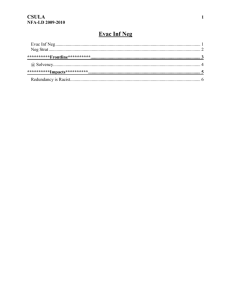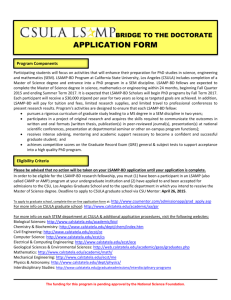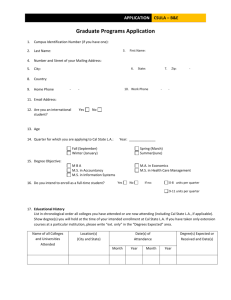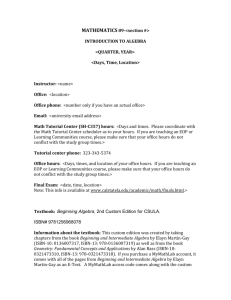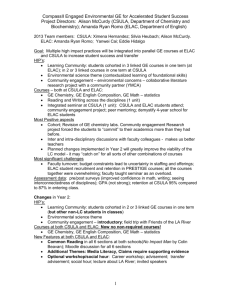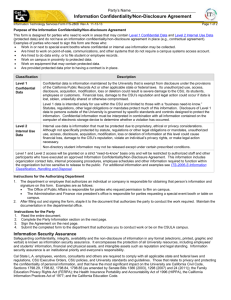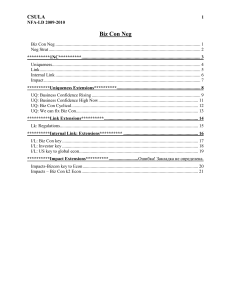csula-coh cancer collaborative - California State University, Los
advertisement
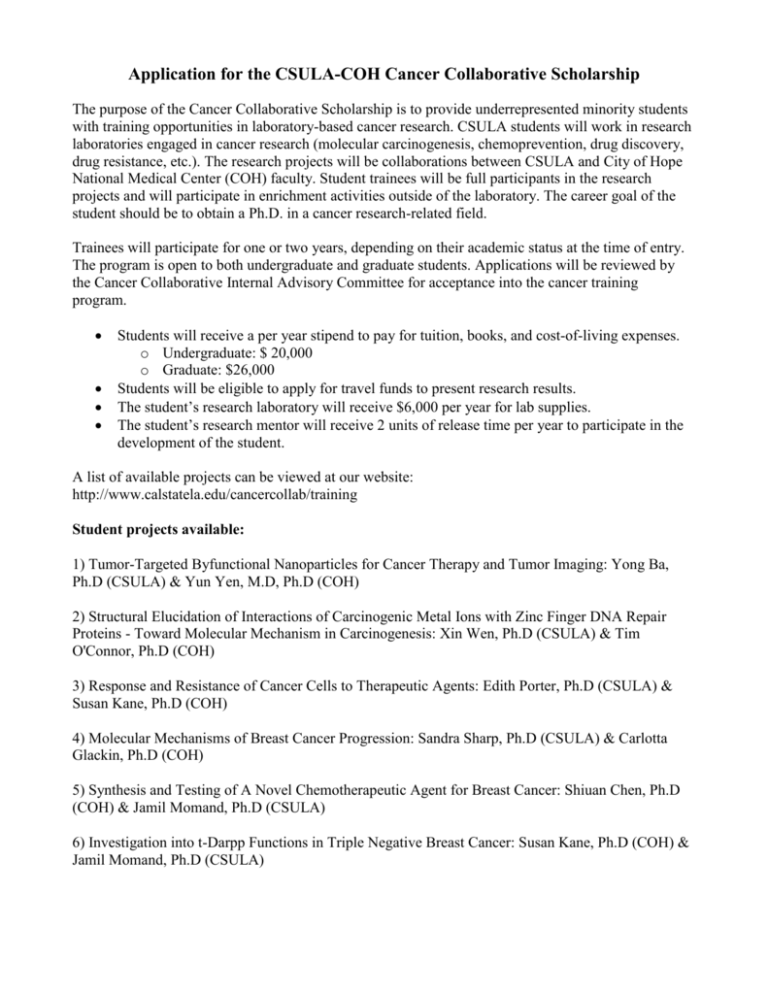
Application for the CSULA-COH Cancer Collaborative Scholarship The purpose of the Cancer Collaborative Scholarship is to provide underrepresented minority students with training opportunities in laboratory-based cancer research. CSULA students will work in research laboratories engaged in cancer research (molecular carcinogenesis, chemoprevention, drug discovery, drug resistance, etc.). The research projects will be collaborations between CSULA and City of Hope National Medical Center (COH) faculty. Student trainees will be full participants in the research projects and will participate in enrichment activities outside of the laboratory. The career goal of the student should be to obtain a Ph.D. in a cancer research-related field. Trainees will participate for one or two years, depending on their academic status at the time of entry. The program is open to both undergraduate and graduate students. Applications will be reviewed by the Cancer Collaborative Internal Advisory Committee for acceptance into the cancer training program. Students will receive a per year stipend to pay for tuition, books, and cost-of-living expenses. o Undergraduate: $ 20,000 o Graduate: $26,000 Students will be eligible to apply for travel funds to present research results. The student’s research laboratory will receive $6,000 per year for lab supplies. The student’s research mentor will receive 2 units of release time per year to participate in the development of the student. A list of available projects can be viewed at our website: http://www.calstatela.edu/cancercollab/training Student projects available: 1) Tumor-Targeted Byfunctional Nanoparticles for Cancer Therapy and Tumor Imaging: Yong Ba, Ph.D (CSULA) & Yun Yen, M.D, Ph.D (COH) 2) Structural Elucidation of Interactions of Carcinogenic Metal Ions with Zinc Finger DNA Repair Proteins - Toward Molecular Mechanism in Carcinogenesis: Xin Wen, Ph.D (CSULA) & Tim O'Connor, Ph.D (COH) 3) Response and Resistance of Cancer Cells to Therapeutic Agents: Edith Porter, Ph.D (CSULA) & Susan Kane, Ph.D (COH) 4) Molecular Mechanisms of Breast Cancer Progression: Sandra Sharp, Ph.D (CSULA) & Carlotta Glackin, Ph.D (COH) 5) Synthesis and Testing of A Novel Chemotherapeutic Agent for Breast Cancer: Shiuan Chen, Ph.D (COH) & Jamil Momand, Ph.D (CSULA) 6) Investigation into t-Darpp Functions in Triple Negative Breast Cancer: Susan Kane, Ph.D (COH) & Jamil Momand, Ph.D (CSULA) Requirements: A) Full-time CSULA student. B) Completion of 90 quarter units of undergraduate coursework. Undergraduate and Graduate students are eligible to apply. C) Declared molecular or life science degree (Biochemistry, Biology, Chemistry, Microbiology, Nutrition, etc.) D) A 2.8 Grade Point Average Procedure: 1) Download the Application Form and the Faculty Recommendation Form at: www.calstatela.edu/cancercollab/training 2) Fill out the Application Form and mail it to the Cancer Collaborative Coordinator. 3) Submit the Faculty Recommendation Form to three faculty references. References should fill out and place in a sealed envelope and send to the Cancer Collaborative Coordinator 4) You may receive an invitation for an interview. If so, come to the interview in business attire. Cancer Collaborative Coordinator: Ronnie Cheng Physical Sciences # 504 Cancer Collaborative Program Chemistry & Biochemistry Department California State University, Los Angeles 5151 State University Drive Los Angeles, CA. 90032 CSULA-COH CANCER COLLABORATIVE APPLICATION FOR CANCER RESEARCH TRAINING PROGRAM Applicant Information Name_ Email Address _ City Telephone (home/cell) (work) Student ID# Ethnicity Zip Date of Birth Black______ Mexican-American______ Mexican______ Puerto Rican______ Cuban______ Other Hispanic____________(specify) American Indian______ Alaska Native______ Pacific Islander______ Filipino______ Other____________(specify) Year in School: ______Fr ______So ______Jr Major ______Sr ______MS1 ______MS2 Expected Date of Graduation Grade point average in Major Overall grade point average (A = 4.00; B = 3.0; C = 2.0; D = 1.0) Career Goals What is your planned educational objective after you graduate from CSULA Graduate School: ______M.S./M.A. ______Ph.D. ______Combined M.D./Ph.D. **Transcripts must be received before consideration of application for participation in the Cancer Collaborative Training Program. Names and Contact Information for References Names and addresses of three (3) faculty members whom you have asked to submit letters of recommendation on your behalf (please have them use the attached faculty recommendation form). Name of Reference Phone Number Email Address Additional Information Please attach the following to complete the application: Transcripts of all your college and university work including all CSULA transcripts. Additional pages (one page total minimum) with your response to each of the following: o o o o o Describe any previous experience you have in research or related areas. Discuss the reasons you wish to participate in the cancer research training program. Comment on your educational and career plans after you complete your studies at CSULA. List any academic (or other) honors you have received. If there is any discrepancy between your grades in academic coursework and your potential, please explain. The Internal Advisory Committee will use your responses above to assess your interest in pursuing a career in cancer research and also your ability to communicate through writing. Arrange to have three (3) letters of recommendation written on your behalf by faculty or senior investigators, using the attached faculty recommendation form. If you have participated in laboratory research, at least one of the letters should be from your research director(s). The letters should be delivered to you in sealed envelopes (signed across the seal) and included in this application packet. Alternatively, the faculty respondents can send the letters directly to the Cancer Collaborative office. I hereby authorize the Cancer Collaborative office access to my university records and release my file to all prospective faculty mentors and the Internal Advisory Committee. My file contains any or all of the following: A copy of my transcripts Personal data Letters of recommendation I understand that in order to revoke this release and authorization, I must do so in writing and that such revocation shall not apply to files that have been released prior to the date of revocation. Signature of the Applicant Date __________________________________________________________________________________ Please return completed application and all attachments to: Ronnie Cheng, Program Coordinator Cancer Collaborative Program Department of Chemistry and Biochemistry Physical Sciences Building, Room 504 If you have questions call: Email: Please visit: 323-343-2494 cancercollab@calstatela.edu www.calstatela.edu/cancercollab
